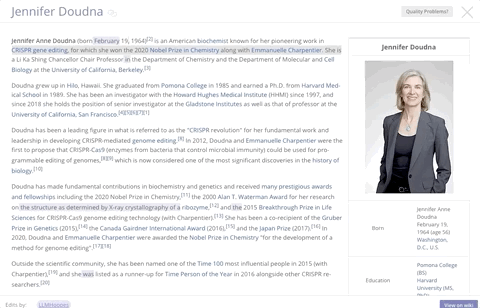We awoke this morning to the exciting news that the Nobel Prize for Chemistry was awarded today to Emmanuelle Charpentier and Jennifer Doudna for their work on CRISPR. It’s exciting to see this amazing discovery recognized, and it’s great to see the prize go to women, but I was especially pleased that a participant in one of our courses had made such a major impact on the Wikipedia biography of one of these Nobel laureates.

Two years ago, Dr. Laura Hoopes, as a participant in one of our Wiki Scholars classes, improved Dr. Doudna’s biography on Wikipedia. Before Dr. Hoopes started working on the article, Dr. Doudna’s work on CRISPR was discussed in a four-sentence paragraph which described it as “a new discovery that would reduce the time and work needed to edit genomic DNA”. Thanks to Dr. Hoopes’ additions, the article explains the revolutionary potential of CRISPR and the role played by Dr. Doudna and her team. Had she not added this content, readers who arrived at Dr. Doudna’s Wikipedia biography to understand why she was awarded this year’s Nobel Prize might have left none the wiser.
There’s more to this story too. As I wrote in a blog post in 2018:
If you read Dr. Doudna’s biography at the start of August, you would you have read about her career as Jack W. Szostak‘s student at Harvard Medical School, as Thomas Cech‘s postdoc at the University of Colorado Boulder, and the way her graduate student (and now, husband) helped her elucidate the three-dimensional folding structure of the Tetrahymena Group I ribozyme. And, below that, four sentences on her contribution to gene editing, including the all-important TED talk. If you read Dr. Doudna’s biography as it stood at the start of August, you would read the biography of a remarkable woman, told in relation to the major men in her life.
Far too often, the women’s achievements are told in relation to men. It’s almost like they are interpreted for “normal readers” through the context of the men in their lives. This is so commonplace, so normal, that it almost becomes invisible. By reframing these sentences just a little, to bring the focus to Dr. Doudna (who is, after all, the central character in her life’s story) Dr. Hoopes was able to eliminate some of the unconscious bias that pervades the way we write about, and see, women’s achievements.
Three years ago, when the Nobel Prize for Physiology or Medicine was announced, participants in Wiki Education’s Student Program were major contributors to the biographies of the three winners. Two years ago when Dr. Donna Strickland won the Nobel Prize for Physics, her absence from Wikipedia was a major embarrassment. Because most Wikipedia articles are written by volunteers who write about what interests them, what’s covered depends on who shows up to write.
If you can, please find a way to show up. To see our current course offerings, visit learn.wikiedu.org.
Image of Dr. Jennifer Doudna: Jussi Puikkonen/KNAW / CC BY
